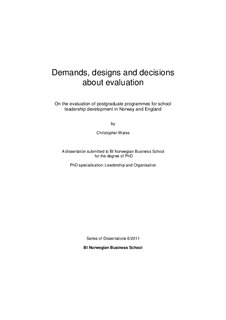Demands, designs and decisions about evaluation: On the evaluation of postgraduate programmes for school leadership development in Norway and England
Doctoral thesis
Permanent lenke
http://hdl.handle.net/11250/94358Utgivelsesdato
2011Metadata
Vis full innførselSamlinger
Sammendrag
The purpose of this study is to investigate decision making processes related to evaluation. The study attempts to combine research from decision making theory and evaluation theory to further explore the evaluation of postgraduate programmes for school leadership framed within a higher education setting. Focus is placed on investigating how providers of postgraduate programmes for school leadership respond in their decision making about evaluation to what is observed to be an increasingly complex and rich web of demands and pressures imposed upon them to assess programme quality and impact. This study addresses problematic areas for evaluative decision making in the phases leading up to implementation, investigating how the subunits under study respond to the demands placed upon them, what designs are considered and how the decision process functions and develops within such cyclical events.
The context for this study is four subunits operating within higher education institutions (HEIs) offering postgraduate programmes for school leadership development. Two subunits are drawn from England and two from Norway. The context has been characterised by an increasingly more complex policy environment linked to the perception that improved leadership at schools will make a contribution to improved pupil outcomes. The English context is characterised by increasingly centralised policy framework for programme delivery, whilst in Norway a more decentralised framework has developed. Additionally, as part of HEIs, the subunits are also subject to multiple pressures related to demands for evaluation and quality assurance emanating from the Bologna Process. Members of the subunits under study are experienced evaluators, who teach about evaluation on their programmes. As such this study might be additionally thought to be about evaluators evaluating evaluation.
The findings present a framework for further investigating and understanding evaluative processes within organisations, and particularly how groups can influence practice despite increased prescription and standardisation.
